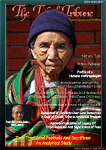Ethno - Pedagogy
The education of the tribal people in lndia has been a dismal failure because it has not grown, evolved or adapted to the changing social forces in the Country. Unfortunately the design and programme for tribal education has neither kept pace with the ethno-cultural values of the tribal people, nor has developed on ethnic identity vis-a-vis national requirement. The gap between the tribal education and elitist education is gradually becoming wider. When the Union Govt. and State Govts, emphasise for widening educational opportunity for minority groups, due emphasis on curriculum planning and school management has not been given for the school systems in tribal belts. The courses and teaching method in the school have not at all been responsive to the sociological needs of the tribal people. Although the mission of the Govt. of lndia and State Govt. seems to bring the tribal people to the mainstream of national life, the school system do not allow enough diversity and experimentation to develop the tribal people from within (Blanket decision made by experts unfamiliar with the cultural values of the tribal people have made it impossible for the tribal people to develop according to their own genius) and accept and adapt to the onrush of industrialisation and technological changes besides the continuing emphasis of the dominant society. When tribal students dropout from school and college, they do not find any place in their natural environment nor do they fit into the dominant society. Their education system therefore has not taken into consideration the sweeping changes that affects their history and foreshadows their environmental dilemma. Ethnic issues raised by the introduction of technology and the problem of interpersonal relationship create for them confrontational attitude with the new masters in administration and in their welfare programme of socioeconomic development. This confrontation affects and alters the world view of the tribal child.
When Indian society is undergoing a change from a rural/ agricultural base to a modern society, the social thinking and the institutional structure needs to be more humane to the "conforming state of affairs" in the minds of the tribal children. The tribal people must be allowed to reconcile with the need for change and their ethnic heritage. So the traditional academic pattern can no longer serve the tribal people well, to integrate them into the dominant society.
In the light of our past experience, we have to mobilise the tribal people for a accepting a fundamental change, so that expanded opportunity and educational innovation could help them getting closer to their aspirations. In order to achieve this end the tribal education need a review along with the planning for the socioeconomic development in the fields of agriculture and industry. In this paper l have proposed a new concept namely "Ethno-Pedagogy", needs to be defined accurately on the basis of ethnographic data on the tribes of lndia. For operational purposes, l suggest that educational planning, ideology, functional viability need to be determined on the basis of micro-studies made on distinct "linguistic-ethnic tribes of India" which will emphasise the contents of the curriculum with specific consideration of the social achievement by the particular ethnic group.
If education aims at continuity and change of human values, then each culture needs to be appreciated and adequately utilized for socioeconomic development rather than melted. Ethno-pedagogy therefore emphasises the distinct culture-identity of the school system of parent tribes, which distinguishes it from others. The small number of cultural variables suggested by Kluckhon and Stordtbeck : Relation of man to nature, mastery over nature, subjugation to nature, harmony with nature etc.; time consciousness of past, present, future; space, social relations (lineality, collatrality, individuality) the morality of human activity (spontaneity vs causation), the character of innate human nature (goodness or badness). Curriculum planning needs to take into consideration these variables in their cognitive, affective and psychometric dimension. Mere spread of dispassionate "economism" in the area of agriculture or industrial development will throw the tribal people to urban ghettos. We need to appreciate each other’s culture rather than "tolerate" it. "Ethno-pedagogy" as a concept will help the tribal people and the dominant society to be closer to each other rather than widening the gap of development. So the educational planners for tribal education should consider the factors of geographical isolation, inadequate pre-service and in-service education of teachers in tribal school system, and relevance of such curricular materials, which considers minority group problem, problems of-bilingualism, and communication networking. We will have to consider the problems concurrently to develop ethno-pedagogy as a viable concept for the reorganisation of tribal education in lndia.
(Source: Random Thoughts, Vignettes on Politics And Cultures, A journalistic Perception by Acharya Bhabananda, Mayur Publications, Bhubaneswar, Odisha, India, Yr. of Publication 2000)
Profile
Dr. Bhabagrahi Mishra is a distinguished cultural anthropologist, folklorist and a socio-literary critic. He has authored books like ‘Verrier Elwin: A Pioneer Indian Anthropologist’ and ‘My Mind At Work’ and has edited ‘Community, Self and Identity’ ‘Management and Workers (The Problems of Interaction)’ and ‘Man, Technology and Environment’. A Gandhian by faith, Dr.Bhabagrahi Mishra aka Acharya Bhabananda has been a political activist with engagements in movements for human rights, women emancipation and environment protection.



